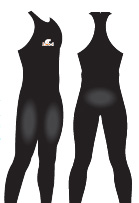After making a sensational splash at last month's Rome World Championships, hi-tech swimsuits have now caused a stir in China as a large number of local swimmers have donned them in pursuit of world-class results leading up to next month's National Games, where the garments will be banned.
As teams prepare for the inter-provincial games, many swimmers - mainly from the more prosperous regions, tried out the hi-tech swimsuits at the National Championships, which concluded yesterday at Beijing's Water Cube.
"The hi-tech swimsuits will be banned at the National Games, so we are only competing with them at this event to feel excited with the results," said Qin Bin, leader of the Shanghai team whose members mainly wore the controversial, Italian-made Jaked swimsuit.
The all-polyurethane outfit helped contribute to 43 records being broken at the July 17-Aug 2 World Championships in Rome. The Chinese swimmers, with four gold, two silver and four bronze medals at the event, achieved their second best result at the Worlds in Jaked suits, which are believed to provide greater bouyancy and streamlining.
However, world swimming's governing body, FINA, stepped in and promptly announced that polyurethane swimsuits will be banned at international competitions from next January.
The Chinese Swimming Association (CSA) followed suit and banned the garment from the Shandong National Games, which start on Oct 11.

With the help of the "magic" suits, Shanghai's Ji Liping, a 100m breaststroke finalist at last year's Beijing Olympics, won the gold medal at the National Championships in one minute, 5.32 seconds, a new Asian record and also the second fastest time in the world this year.
"It (the new record) is a good thing for China's swimming," said Luo Xuejuan, China's former world champion and Olympic gold medalist in the event, who watched Ji's performance from the stands. "But due to the factor of the swimsuit it's hard to judge how much the results have been improved. We still have to wait and see next year."
Ji said the result came from her hard work but admitted the suit did help. As did Shanghai's 17-year-old male swimmer, Jiang Haiqi, who claimed a hat-trick by winning the 200m, 400m and 4x200 relay freestyle events, all in personal best times.
The CSA said only three international brands - Speedo, Blubseventy and Nike, as well as some domestic brands can be worn at the National Games.
"The power of each team should be based on the training levels of their swimmers," said Yuan Haoran, a CSA official. "At present, there is no channel for the import of those hi-tech swimsuit in China, so if we allow them to be used, some teams will purchase the hi-tech ones and that's not fair."
The move has gained support from most of the coaches.
"The ban on the hi-tech suits will push the teams to focus more on training and study of the profession," said Chen Yinghong, coach of Zhang Lin, who won China's first men's world title in Rome.
Zhang switched to a Jaked suit after his men's 800m freestyle heats and won gold in a world-record time.
The remarkable results gained by swimmers in Jaked suits caught the attention of the local teams in China and it is believed some asked participants at the Worlds to buy them suits, which cost at least 300 euro apiece (2,930 yuan).
Yuan denies that took place and said the aim of the ban was to avoid the teams unnecessarily wasting money.
"The official sponsor of the Worlds is Speedo, so no other brand was allowed to sell at the Worlds. The rush to purchase Jaked suits in Rome is not true," Yuan told the Beijing Daily. "Those Jaked suits the Chinese swimmers wore were given to them by the manufacturers for free and those suits were collected by the national team. So none were available for the local teams."
Coach Qin said the Jaked suits worn by the Shanghai swimmers were brought by foreign coaches serving the team.
(China Daily September 1, 2009)